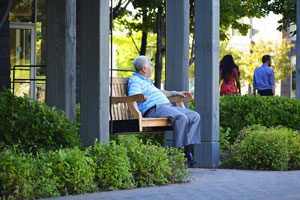 That title may come as no surprise to many seniors. To many, loneliness is their only companion and perhaps their only visitor. The American Association of Retired People (AARP) published the results of its own loneliness study in the November/December 2010 edition of its magazine. According to the AARP, about 42.6 million American adults over age 45 suffer from chronic loneliness.
That title may come as no surprise to many seniors. To many, loneliness is their only companion and perhaps their only visitor. The American Association of Retired People (AARP) published the results of its own loneliness study in the November/December 2010 edition of its magazine. According to the AARP, about 42.6 million American adults over age 45 suffer from chronic loneliness.
Mental health experts tell us that it is normal for all of us to feel lonely at times, especially after a loss, such as death or divorce. Chronic loneliness is a different matter; it is ever-present, often self-perpetuating and leads to a rejection of personal relationships. Chronic loneliness makes seniors not only unhappy, but also unhealthy.
An increased chance of developing higher stress levels, a weakened immune system, diabetes or even Alzheimer’s disease have all been associated with chronic loneliness. Seniors face several inescapable circumstances that may contribute to loneliness and isolation. Many are retired; as hectic and invasive as work may have once seemed, it served to keep people connected. As seniors age, they find that more and more of their friends and families have passed away and those friendships have not been replaced. Illness and lack of mobility may keep some seniors from forming new social connections.
There are several things that seniors and their loved ones can do to avoid chronic loneliness. There’s no certain cure for chronic loneliness, but these are steps you or your loved one can take to lower the risk.
- Volunteer. Seniors have one asset in greater quantity than other age groups: time. Find some cause or service organization to which you can donate your time and talents. This will introduce you to new relationships, new interests and opportunities.
- Nurture personal relationships. When old contacts and personal relationships fade or disappear because of death, illness or geography, actively try to replace them with new contacts. Try to stay in touch with former work colleagues after you retire and with old neighbors after you have moved.
- Join a civic organization, social club or community organization. OurSeniors.net Magazine, our senior living magazine, is a good place to start. You are sure to find something there to interest you.
- Continue your education. Local community colleges, senior centers, libraries and other organizations are often a good source of help in finding these opportunities. Taking a class or educational excursion will keep you in contact with people who are likely to share your interests.
OurSeniors.net has a vital interest in promoting the health and welfare of all seniors. We are familiar with the senior assisted living facilities and the retirement communities in Florida. We know that opportunities for socialization are one of the keys to good quality active senior communities. Retirement communities, as well as 55+ communities and senior assisted living facilities, are fortunate to have abundant year-round opportunities for recreation and social activities.
We can answer questions like, “What are the best senior assisted living facilities near me?” When you need trustworthy and unbiased advice about these or any other senior assisted living questions, please call on us. You can contact OurSeniors.net by clicking the link or by calling 866-333-2657.
